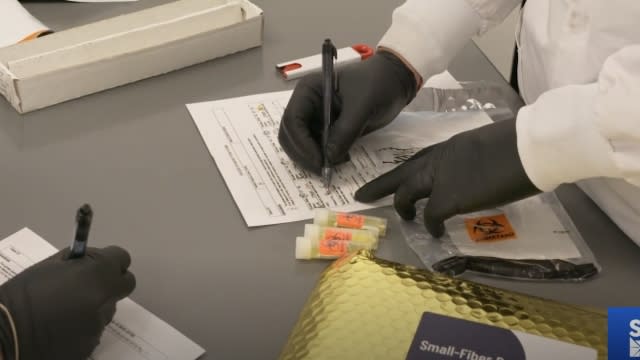A new skin test is being used to help diagnose Parkinson's

Jon Schorr of Bainbridge Island, Washington, has hit the gym three times a week for 45 years. After a Parkinson’s diagnosis, the workouts hit different.
“My brother had Parkinson’s quite badly. And when he died, he was totally frozen up, falling all the time. And so for me, it was, it was confirmation that I really didn’t want,” said Schorr.
Doctors have started using a skin test called Syn-One to help diagnosis Parkinson’s disease. It can detect a protein key to Parkinson’s called alpha synuclein in a few sharp pokes.
“The entire test takes about 15 minutes at the bedside is relatively painless. We numb the skin with, lidocaine,” said Dr. Pravin Khemani, a neurologist.
Three punches take biopsies of skin, from the ankle, calf, and behind the neck. They then go to CND Life Sciences which analyze the samples and test them in lab.
“The average cost of the Syn-One Test for a patient paying themselves is less than $1,500 and CND has flexible payment plans to help,” says Rick Morello, CND Life Sciences CEO. “Most of the time, insurance will cover a significant portion of the test, including Medicare and Medicare Advantage plans. When this happens the patient typically pays less than $400.”
SEE MORE: New technology introduced to help Parkinson's patients walk
Traditionally, doctors diagnosed Parkinson’s first by symptoms: freezing when walking, stiffness and tremors.
But research shows 20% of patients can be wrongly diagnosed with Parkinson’s. Neurologist Dr. Pravin Khemani uses the test for his patients alongside his evaluation.
“Because the disease is so different in different individuals, and it evolves gradually over time. There can be a delay in the diagnosis. And what this test has done is effectively shortened the time to diagnosis,” said Khemani.
New research shows the test correctly caught the Parkinson’s protein in 93% of people already diagnosed with Parkinson’s.
“With Parkinson’s, there’s a lot of rigidity, stiffness, kind of uncontrollable movement and balance issues,” said Schorr.
The workouts continue with his Parkinson’s specialized trainer.
“We want to continue to do a lot of big exaggerated movements to kind of keep those movement patterns kind of instilled in their brain,” said Quinto Agosta, Ortho-Kinetics professional trainer.
He takes medication daily too. While his positive test was like a punch to the gut, he says it’s motivating him to punch back for his health.
“I want to be able to drive. I want to stay in my house, as long as I can. So it’s very important to me to push this regimen,” said Schorr.
Research shows earlier treatment means better long-term outcomes for Parkinson’s patients. That’s why he plans to keep fighting for his independence and long as he can.
